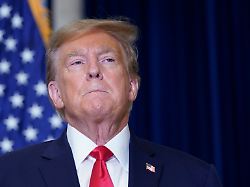Immunity as a former president
Trump uses new process to stage victimization
January 9, 2024, 10:00 p.m
Listen to article
This audio version was artificially generated. More info | Send feedback
Does the office of president protect against prosecution? An important question for former US President Trump with a view to the proceedings regarding the storming of the Capitol in 2020. This very question should be clarified in another court hearing. For Trump, the answer is already clear.
Former US President Donald Trump has warned of “chaos in the country” if the prosecutions against him continue. It would be “very unfair” for him to be prosecuted by the Justice Department as a political opponent of President Joe Biden, Trump told reporters in Washington after a hearing before a federal appeals court. It is an attempt to win the presidential election in November “this way”.
Trump wants to challenge Biden in the election and, according to polls, has the best chance of being nominated by his Republican Party for the election on November 5th. The Republican primaries to choose their presidential candidate begin next Monday (local time) in the state of Iowa. At the same time, Trump faces four criminal charges in the election year.
The court hearing now scheduled was about the question of how comprehensive Trump’s immunity as ex-president against criminal prosecution is. However, the court has not yet made a decision on this issue. Trump was in the room during the hearing but did not speak. But like previous court dates, he also used this with his subsequent statement to the press to portray himself as a victim of an allegedly politically controlled judicial apparatus.
Immunity issue must be resolved before other processes
In court, Trump’s lawyer John Sauer previously described it as a “shocking position” that a former president could be prosecuted for “official actions” while in office. This would open a “Pandora’s box” for further prosecutions of ex-presidents, he warned. Trump’s lawyers argue that Trump enjoys “absolute immunity” and cannot be prosecuted for actions that fall within his term of office.
Federal judge Tanya Chutkan rejected this argument at the beginning of December. Trump’s four years as president “have not given him the divine right of kings to avoid the criminal liability to which his fellow citizens are subject,” she found. Trump’s lawyers again appealed the judge’s decision. The Federal Court of Appeal is now dealing with this appeal.
The trial against Trump in federal court over election manipulation allegations is currently scheduled to begin on March 4, right in the middle of the presidential primaries. However, the proceedings cannot take place without prior clarification of the immunity issue – which is why it is unclear whether the trial date can be adhered to.
Trump and his lawyers are playing for time and want to prevent the trial from taking place in the middle of the race for the White House. The dispute over his immunity is expected to ultimately end up in the country’s highest court. Trump has also been indicted by the Georgia state judiciary for his attempts to overturn the 2020 election results.
